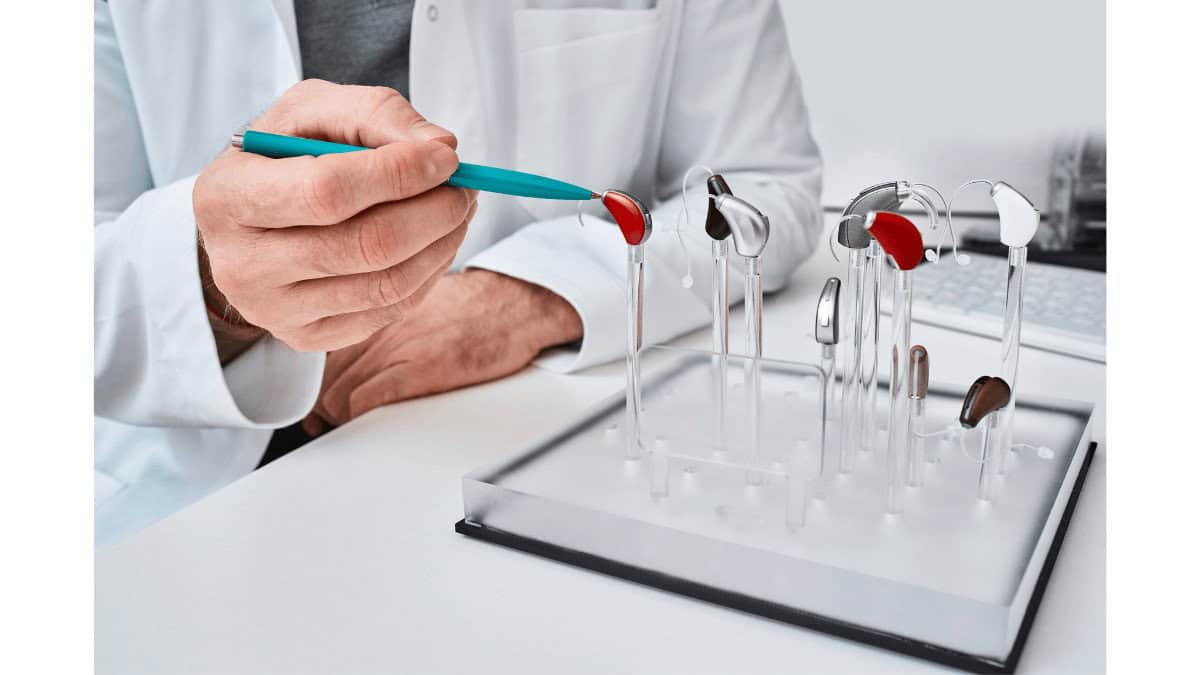Hearing aids provide an effective solution for improving auditory function and enhancing the quality of life for those with hearing loss. But as with any technology, first-time users may have a few questions.
We’re here to answer some of the most frequently asked questions about hearing aids, covering types, styles, features, costs, and maintenance.
What Are The Types of Hearing Aids?
- In-the-ear (ITE) Hearing Aids: These hearing aids are custom-fitted to sit in the ear canal and provide a discreet and comfortable option. ITE hearing aids are suitable for mild to moderate hearing loss and can be easily removed for cleaning and maintenance.
- Behind-the-ear (BTE) Hearing Aids: BTE hearing aids consist of a small casing behind the ear that connects to an earmold in the ear canal. They are suitable for mild to profound hearing loss and offer a range of features and accessories, including telecoil, directional microphones, and rechargeable batteries.
- Receiver-in-canal (RIC) Hearing Aids: RIC hearing aids are similar to BTE hearing aids but have a small external receiver connected to the earmold in the ear canal. They provide a comfortable option and are suitable for mild to moderate hearing loss.
- Completely-in-the-canal (CIC): CIC hearing aids are small hearing aids that sit fully in the ear canal. They are suitable for mild to moderate hearing loss and offer minimal visibility and wind noise.
- Invisible-in-the-canal (IIC): As the name suggests, IIC hearing aids are completely invisible as they sit deep inside the ear canal. They are suitable for mild to moderate hearing loss and offer optimal discretion and natural sound quality.
What Are the Most Important Hearing Aid Features?
- Telecoil: A telecoil is a coil inside the hearing aid that allows users to tune in to magnetic signals from telephones, public address systems, and induction loop systems. It provides clear sound quality and reduces background noise.
- Directional Microphones: Directional microphones are designed to amplify sound in front of the user while reducing background noise from behind and around. They offer improved speech understanding and clarity in noisy environments.
- Bluetooth Connectivity: Bluetooth connectivity enables hearing aids to connect wirelessly to smartphones and other compatible technology, such as televisions and computer systems. It provides improved accessibility, convenience, and sound quality.
How Much Do Hearing Aids Cost?
- Insurance Coverage: Many insurance plans offer coverage for hearing aids, including Medicare, Medicaid, and private insurance providers. Coverage can vary depending on the type, style, and technology of the hearing aid.
- Out-of-Pocket Expenses: Out-of-pocket expenses for hearing aids can vary widely, ranging from several hundred to several thousand dollars per device. The cost can depend on several factors, including the type, style, features, and manufacturer of the hearing aid.
- Assistive Technology Programs: Several organizations and programs offer financial assistance or low-cost hearing aid options, including the Hearing Loss Association of America, the Lions Club, and state and local vocational rehabilitation agencies.
What Are the Best Maintenance Techniques?
- Cleaning and Maintenance: Regular cleaning and upkeep will boost performance and longevity. Common maintenance tasks include changing batteries, cleaning earwax and moisture, and checking for damage or malfunctions.
- Adaptation and Adjustment Period: Adjusting to hearing aids can take time, and most experts recommend a gradual adaptation process. It is important to work closely with a hearing healthcare professional to ensure proper fit, programming, and adjustment of the hearing aids.
- Daily Use and Care Tips: Effective daily use and care can help users get the most out of their devices. Tips include storing hearing aids in a dry and cool place, avoiding exposure to moisture and extreme temperatures, and wearing hearing aids consistently and appropriately.
Find Your Next Hearing Aids
Hearing aids can significantly improve the quality of life for individuals with hearing loss. We’re here to help answer all your questions about your hearing loss, hearing needs, and hearing aids. Find out more about top technology and features, then ask more about cost concerns.
Our qualified hearing healthcare professionals will work with you to select, fit, program, and maintain your hearing aids, and make sure they completely match your specific needs and preferences. Visit us today to learn more.


